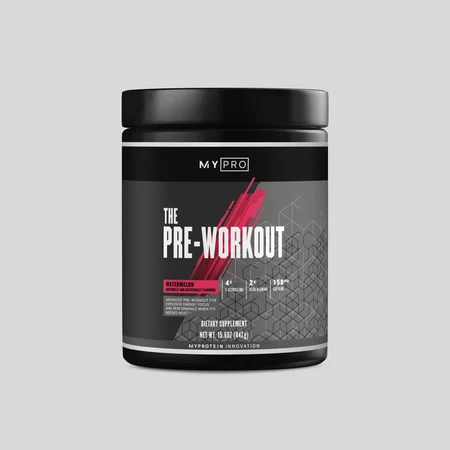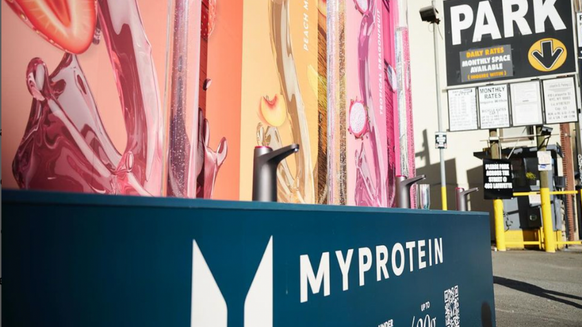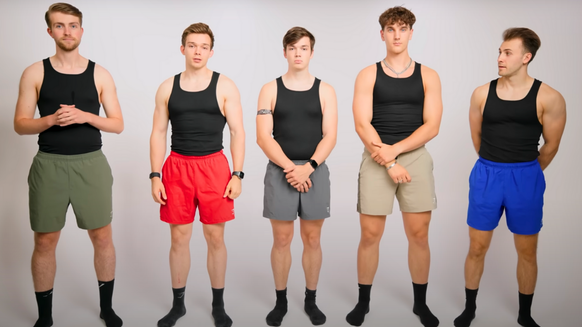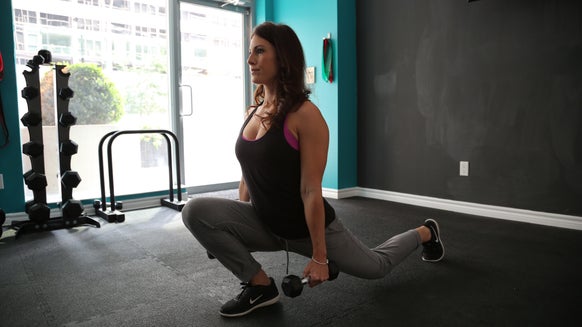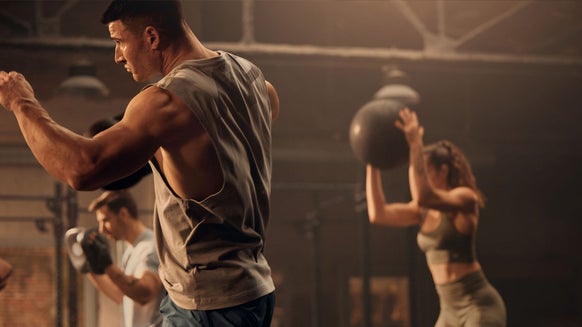
If you're looking to build a muscular physique, shoulder dumbbell workouts are a great place to start. Building full, dense shoulders is key to a powerful upper body.
One of the best ways to build serious shoulder mass is by using dumbbells. They're a versatile piece of equipment that can be used for a wide range of exercises.
In this guide, you’ll discover the best dumbbell shoulder workouts to build mass, along with a full workout plan to help you get the most out of your training.
- The Shoulder Muscles Explained
- 9 Best Dumbbell Shoulder Exercises to Build Mass
- Supplements to Support Your Training
- Shoulder Workout Plan for Building Mass
The Shoulder Muscles Explained
The deltoid (delts) is the main muscle you're targeting when training your shoulders. The shoulder is a ball-and-socket joint, which means it’s extremely mobile compared to other joints like the knee or elbow. This allows your arms to move in any direction — upwards, backwards, sideways — and to rotate inward and outwards.
The external shoulder muscles are made up of three main parts: the anterior deltoid (front), lateral deltoid (side), and posterior deltoid (rear). To build well-rounded, strong shoulders, you need to target all three heads.
9 Best Dumbbell Shoulder Exercises to Build Mass
Dumbbells are one of the most accessible pieces of gym equipment for a workout, making these exercises ideal for beginners and home workouts. Here are nine of the best dumbbell workouts to target every part of your shoulders and build mass.
1. Dumbbell shoulder press
The dumbbell shoulder press is a great exercise for building shoulder mass and strength. It’s a compound movement, which means it uses multiple muscles at once, allowing you to lift more weight. This exercise primarily targets the anterior delts and triceps.
You can do the dumbbell shoulder press either seated or standing. The seated variation is better for isolating the shoulders and removing support from the legs and lower back. For muscle growth, aim for a rep range of 8 to 12 reps.
How to do the dumbbell shoulder press:
Avoid using weights that are too heavy. The shoulder joint is mobile and needs to be stabilized during the exercise, so using very heavy weights can increase your risk of injury.
- Pick a suitable weight for your desired number of reps. Lift each dumbbell to shoulder height with your palms facing forwards.
- Push the weight up overhead until the dumbbells touch. Then, lower the weight back down to the starting position.
- Ensure you complete full reps. A greater range of motion uses more muscle fibres, which leads to better muscle growth.
- Repeat for your chosen number of reps and sets, trying to keep the weight consistent throughout your workout.
2. Dumbbell front raise
The dumbbell front raise is an isolation exercise that primarily targets the front head of the shoulder. Since it isolates the muscle, you may need to use lighter weights. With isolation exercises, you can also use a higher rep range, from 10 to 20 reps.
Focus on using your shoulder muscles to do the work. Avoid swinging or using momentum to lift the weight. Each rep should be controlled.
How to do the dumbbell front raise:
- Stand tall, holding a set of dumbbells against your thighs with your palms facing inwards.
- Raise one dumbbell in front of you so it comes just above your shoulder line. Your arm should be almost straight but with a soft elbow, and your palm should be facing the floor.
- Hold at the top for a second and then slowly lower the dumbbell back down. Then, raise the opposite arm and repeat the sequence.
- Aim for 10 to 15 reps per arm.
3. Dumbbell side lateral raise
The dumbbell side lateral raise works the lateral delts (side of the shoulders), the muscle that contributes most to the appearance of shoulder size. The best way to develop this muscle is through shoulder abduction, which means moving the arm away from the body.
This exercise works well with a medium to light weight for higher reps. It can be challenging to do with heavy weights, so focus on muscle growth rather than lifting a heavy load. It can be done seated or standing, but doing it seated reduces the need for support from your lower back, forcing your shoulders to work harder.
How to do the dumbbell side lateral raise:
- Grab a dumbbell in each hand and sit on a bench with your palms facing inwards, next to your thighs.
- Lift your arms out to the side until your knuckles are in line with your shoulders and the weights are parallel to the floor. Hold this position for a second and slowly lower the weights back to the starting position.
- Try to focus on working your shoulder heads. It’s easy for your trap muscles to take some of the strain.
- For the standing variation, stand in the same position you would for front raises but with your hands at your sides.
- Aim for 2 to 3 sets of 12 to 15 reps.
4. Dumbbell bent-over raise
The dumbbell bent-over raise targets the posterior delts at the back of the shoulder. For many, this muscle is underdeveloped compared to the other parts of the shoulder. But if you want defined shoulders with large muscle mass, you can't neglect the posterior delts.
Like the front and side raises, this exercise can be done with a lighter weight and more reps. It’s not uncommon for this muscle to be underdeveloped, so don’t be surprised if you can’t use much weight when you’re just starting out.
How to do the dumbbell bent-over raise:
- For the standing variation, keep your spine straight and bend over so your torso is nearly parallel to the floor. Keep your head in a neutral position and avoid extending your neck upwards.
- Your arms should hang in front of you with the dumbbells in your hands and your palms facing each other. Your elbows should have a very slight bend.
- Engage your rear delts and pull your elbows up towards the ceiling in a reverse fly motion. The weights should end up close to parallel to the floor with your palms facing the floor.
- Keep your torso still and your core engaged throughout the movement.
- Aim for 2 to 3 sets of 12 to 15 reps.
5. Dumbbell upright row
The dumbbell upright row can be used to target your shoulders or traps, depending on how wide or narrow you keep your elbows. The closer you keep your hands together, the more the exercise works your traps. The wider you keep them, the more it works your side delts.
This is a compound exercise, so you can use heavier weights than you would with isolation movements.
How to do the dumbbell upright row:
- Grab a set of dumbbells and stand up straight with the weights resting on the front of your thighs and your palms facing downwards.
- Engage your side delts and lift your hands and elbows upwards, keeping your palms facing the floor.
- At the top of the movement, the weights should be in line with your shoulders. There should be almost a 90-degree bend from your elbow to your shoulder.
- Hold this position for a second and return slowly to the starting position.
- Aim for 3 sets of 8 to 12 reps.
6. Dumbbell shrugs
If you want to develop your neck and traps, look no further than dumbbell shrugs. This exercise is simple to perform, but proper form and technique are essential. Avoid selecting a weight that's too heavy and focus on a full range of motion.
Dumbbell shrugs can be trained in a wide rep range, anywhere from 6 to 15 reps.
How to do the dumbbell shrug:
- Pick up a dumbbell in each hand and hold the weights at your sides, by your thighs.
- Your arms should be fully extended with relaxed elbows. Lift the dumbbells as high as you can with your traps by shrugging your shoulders up towards your ears.
- Hold for a second before lowering them back down to the starting position.
- Engage your core and repeat. Avoid pushing your head forward, as this shortens the movement and makes it less effective.
- Aim for 2 to 3 sets of 8 to 12 reps.
7. One-arm dumbbell swing
This exercise is similar to kettlebell swings but uses a single dumbbell. It's a great exercise for a full-body workout and can help increase your heart rate for extra calorie burn.
How to do the one-arm dumbbell swing:
- Hold a dumbbell at arm's length between your legs.
- Sink into a squat and swing the dumbbell through your legs. Immediately drive your hips forward, bringing the dumbbell up to head height as you straighten your legs.
- Repeat this movement, then swap sides.
8. Spellcaster
The spellcaster will not only increase your heart rate but also improve shoulder mobility through the rotational movement. This exercise can increase both strength and size.
How to do the spellcaster:
- Hold a dumbbell in each hand.
- Stand with your legs wide and knees slightly bent.
- Swing both dumbbells to one side and lift them up as if drawing a circle from hip level to above shoulder height.
- Swing the weights to the other side, dipping down to your hip before raising them again. Keep repeating this motion.
9. See-saw press
The dumbbell see-saw press allows you to work with heavier weights overhead since only one will be above your head at a time. The exercise incorporates your entire upper body and helps build structural integrity and strength.
How to do the see-saw press:
- Hold two dumbbells just behind your shoulders, with your palms facing forwards.
- Push one dumbbell straight above you while lowering the other. When one arm is fully extended, the other should be back in the starting position.
- Alternate arms to create a see-saw motion. One rep is counted as both arms performing the move.
Supplements to Support Your Training
Fuel your workout and recovery with these Myprotein essentials.
Shoulder Dumbbell Workout Plan for Building Mass
This workout plan contains a combination of dumbbell exercises designed to target all the muscles in your shoulder and increase overall muscle mass. Perform this workout 1-2 times per week, allowing at least 48 hours of rest between sessions.
| Exercise | Sets and reps |
|---|---|
| Dumbbell shoulder press | 3 sets x 10-12 reps |
| Dumbbell side lateral raise | 3 sets x 12-15 reps |
| Dumbbell bent-over raise | 3 sets x 15 reps |
| Dumbbell upright row | 2 sets x 12-15 reps |
| Dumbbell shrugs | 2 sets x 12-15 reps |
Take Home Message
Dumbbells are a fantastic tool for building your shoulders. They can be used to perform a wide range of compound and isolation exercises to hit every angle and muscle of the deltoid group.
Whether you’re at home or in the gym, dumbbell shoulder workouts are an ideal way to build strength and mass.
READ MORE HERE:
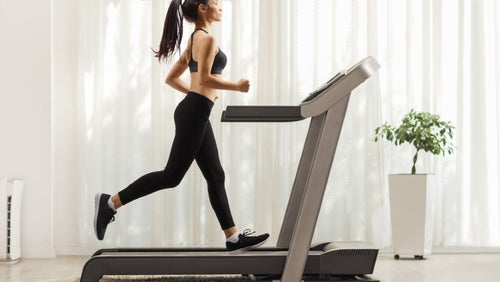
Treadmill Workouts: PT Reviews 12-3-30 & 10-2-20
The workout the internet can't stop talking about....

10 Best Chest Exercises for Women
Sculpt your upper body with these simple moves....
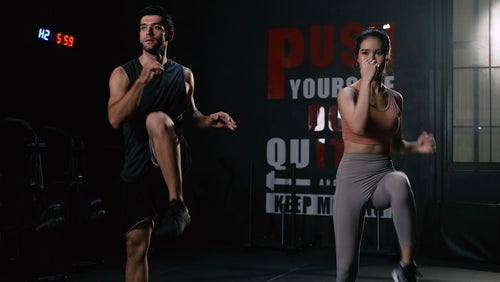
20 Minute HIIT Workout At Home | No Equipment Workout
This upper body HIIT workout is ideal for keeping you on track even if you can’t...



